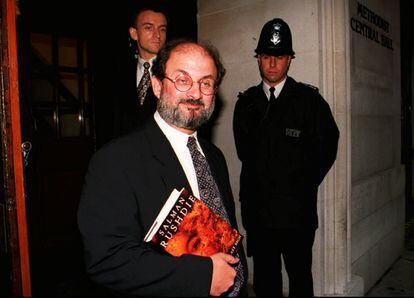The best way to measure Salman Rushdie's worth as a writer is to dive into his extraordinary memoir,
Joseph Anton
(2012), not because it's his best work, which it probably is, but to enjoy the depth and quality of his language, his adroit prose, and a mastery of nonfiction that surprises only because he is so well known for his fantastical novels.
Joseph Anton
explores Rushdie's life as a public intellectual, and his bold commitment to the political and social issues of the day.
But Rushdie's affinity for fiction still looms over it all.
Rushdie used “Joseph Anton” as a pseudonym while in hiding following the
fatwa
(death sentence) declared by Iran's Ayatollah Khomeini.
He took the first names of two writers he admired and emulated when he first began his literary journey – Joseph Conrad, who told stories about the same world Rushdie would later write about in a postcolonial vein, and Anton Chekhov, master of the transience of short prose.
I have entrusted the story of his life to these two literary giants, a story marked by the difficult circumstances of a decade in hiding from the
fatwa
imposed for his purportedly blasphemous book,
The Satanic Verses
(1988).
If you only have time to read one Rushdie book, I wholeheartedly recommend
Joseph Anton
.
There is much more, of course.
While many dismiss
The Satanic Verses
because of its non-literary notoriety, it is stylistically and conceptually interesting for the boldness of the prose and its literary vision.
The novel is a fine example of Rushdie's characteristic flights of fantasy juxtaposed with sober and restrained realism.
Rushdie's work often explores unstable societies.
His most lauded novel –
Midnight's Children
(1981) – won the Booker Prize, and, in 1993 and 2008, was awarded the Best of the Bookers as the best novel to have received the prize during its first 25 and 40 years.
The novel begins with an indelible image: a clock strikes midnight on August 15, 1947, when India and Pakistan gained independence from the British Empire.
Rushdie unfolds a formidable historical frieze that explores the uneasy coexistence of two nations scarred by a lamentable antagonism between their principal religions – Hinduism and Islam.
Rushdie, who was born in Bombay into a Muslim family, is not a religious man.
His secularism, civic commitment, and courageous opposition to religious fanaticism would later cost him dearly.
Salman Rushdie, with a copy of 'The Satanic Verses' in 1995. aSSOCIATED PRESS
Salman Rushdie is a powerful and prolific writer who has produced an impressive body of fiction and nonfiction work.
Last year, he published
Languages of Truth: Essays 2003-2020
, not long after his 2019 novel
Quichotte
, a delirious rewrite of the Cervantes classic,
Don Quixote
, that explores the relationship between fantasy and reality in the technological age.
A new Rushdie novel,
Victory City
, is expected in February 2023. Between
Midnight's Children
and
Victory City
are a number of notable novels –
Fury
(2001),
Shalimar the Clown
(2005), and
The Enchantress of Florence
(2008).
Rushdie's fiction is firmly rooted in the various streams of fantasy literature.
He has professed admiration for Gabriel García Márquez and Latin American magical realism, and the influence of
One Thousand and One Nights
is evident in
The Moor's Last Sigh
(1995) and
Haroun and the Sea of Stories
, a children's book he wrote for his son in 1990.
Salman Rushdie's fictional world springs from a deep understanding of literary history that is reflected acutely in the short stories of
East, West
(1994), a book that deftly interweaves the two literary traditions alluded to in the title.
His intellectual curiosity about him has led him to befriend strikingly different personalities like Edward Said, whose thesis on the end of colonialism in literature Rushdie has reflected in several works, and Thomas Pynchon, whom he met at a dinner that he later described in a hilarious anecdote
Salman Rushdie is well-known, loved, and respected in New York City, the place he calls home.
Courageous, full of energy, and always politically committed, he continued to make public appearances even during the most dangerous times of the
fatwa
, which led him to embrace freedom of expression in literature.
He co-founded the PEN World Voices Festival in 2005 when he was president of PEN America, a nonprofit writers' organization.
The annual festival showcases international literature and new writers.
The city adopted by Salman Rushdie now anxiously awaits news of his health from him after his vicious attack from him.
The Indian-born, UK-educated connoisseur of British and Anglo-Indian literature has had a distinguished and prolific career spanning more than 50 years that unflinchingly observes the paradoxes of an ailing society.
It's the society of
The Golden House
(2017), where people live under a sinister shadow cast by the likes of Donald Trump.

